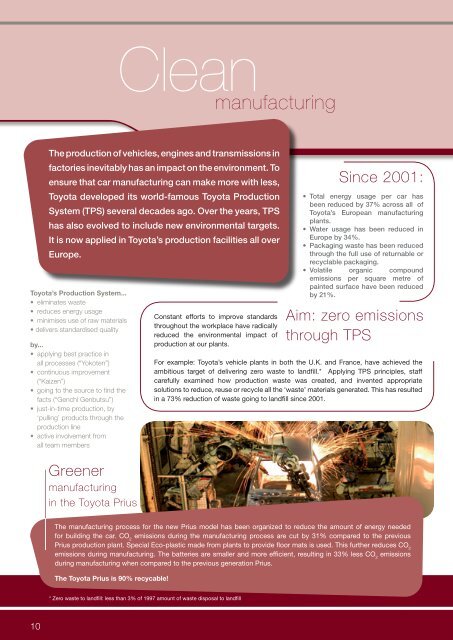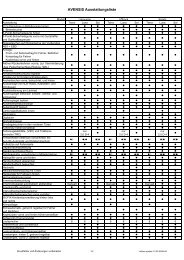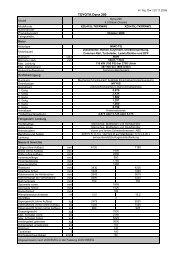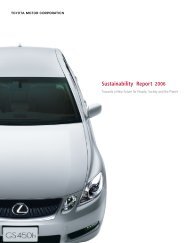Create successful ePaper yourself
Turn your PDF publications into a flip-book with our unique Google optimized e-Paper software.
The production of vehicles, engines and transmissions in<br />
factories inevitably has an impact on the environment. To<br />
ensure that car manufacturing can make more with less,<br />
<strong>Toyota</strong> developed its world-famous <strong>Toyota</strong> Production<br />
System (TPS) several decades ago. Over the years, TPS<br />
has also evolved to include new environmental targets.<br />
It is now applied in <strong>Toyota</strong>’s production facilities all over<br />
Europe.<br />
toyota’s production system...<br />
• eliminates waste<br />
• reduces energy usage<br />
• minimises use of raw materials<br />
• delivers standardised quality<br />
by...<br />
• applying best practice in<br />
all processes (“Yokoten”)<br />
• continuous improvement<br />
(“Kaizen”)<br />
• going to the source to find the<br />
facts (“Genchi Genbutsu”)<br />
• just-in-time production, by<br />
‘pulling’ products through the<br />
production line<br />
• active involvement from<br />
all team members<br />
10<br />
Greener<br />
manufacturing<br />
in the <strong>Toyota</strong> Prius<br />
Clean<br />
manufacturing<br />
Constant efforts to improve standards<br />
throughout the workplace have radically<br />
reduced the environmental impact of<br />
production at our plants.<br />
Since 2001:<br />
• Total energy usage per car has<br />
been reduced by 37% across all of<br />
<strong>Toyota</strong>’s European manufacturing<br />
plants.<br />
• Water usage has been reduced in<br />
Europe by 34%.<br />
• Packaging waste has been reduced<br />
through the full use of returnable or<br />
recyclable packaging.<br />
• Volatile organic compound<br />
<strong>emissions</strong> per square metre of<br />
painted surface have been reduced<br />
by 21%.<br />
Aim: <strong>zero</strong> <strong>emissions</strong><br />
through TPS<br />
For example: <strong>Toyota</strong>’s vehicle plants in both the U.K. and France, have achieved the<br />
ambitious target of delivering <strong>zero</strong> waste to landfill.* Applying TPS principles, staff<br />
carefully examined how production waste was created, and invented appropriate<br />
solutions to reduce, reuse or recycle all the ‘waste’ materials generated. This has resulted<br />
in a 73% reduction of waste going to landfill since 2001.<br />
The manufacturing process for the new Prius model has been organized to reduce the amount of energy needed<br />
for building the car. CO 2 <strong>emissions</strong> during the manufacturing process are cut by 31% compared to the previous<br />
Prius production plant. Special Eco-plastic made from plants to provide floor mats is used. This further reduces CO 2<br />
<strong>emissions</strong> during manufacturing. The batteries are smaller and more efficient, resulting in 33% less CO 2 <strong>emissions</strong><br />
during manufacturing when compared to the previous generation Prius.<br />
the toyota prius is 90% recycable!<br />
* Zero waste to landfill: less than 3% of 1997 amount of waste disposal to landfill
















